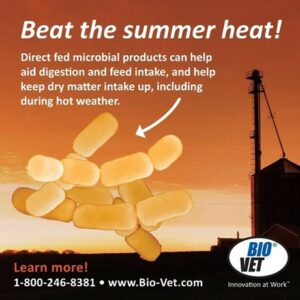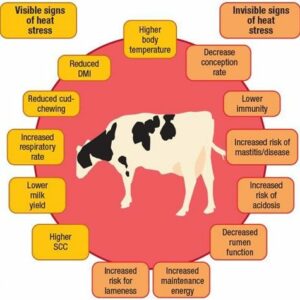Heat stress occurs when livestock generate and absorb more heat than they can easily get rid of by respiration, sweating, and air blowing by them (wind or fan). Dairy cattle generate heat by digesting feed and producing milk. They absorb solar heat when out in the sun. If it is a hot day and the cows are out in the sun all day, heat stress can occur.
Negative Effects of Heat Stress
Heat stress leads to increased respiration rates, body temperatures, sweating, and time standing. Heat stress can cause many issues for the cows and the farmer. Lactating cows have reduced dry matter intake, milk production, and pregnancy rates when they are affected by heat stress. Heat stress also leads to increased lameness, disease incidence, days open, and death rates.
Cattle also result in shorter gestation periods, calves with lower birth weights, reduced milk production, and impaired immune function due to heat stress. Heifer calves born from heat-stressed cows produce less milk for the first 30 weeks of lactation after fleshing. Heat stress is an important issue as there are so many negative effects that occur.
Prevention Methods
How do we prevent heat stress in cattle?
- Water is essential when the weather gets hot. Water consumption increases considerably when temperatures increase. High-yielding cows may drink up to 211 quarts per day. Water troughs should be checked daily for good water quality and cleanliness. Large open water troughs that are easily accessible are preferred.
- Another way to prevent heat stress is the type of housing you have. Ventilation in barns is key to keeping cattle cool. Open-sided barns with natural side-ways ventilation, together with mechanical ventilation from 68° F onwards, are a very effective way to keep cattle cool.
- Feed management is another way to prevent heat stress. Feeding more often at cool moments of the day. Adjusting the ration is advised as well. Decreasing concentrates, and feed more easily degradable forages. These adjustments reduce the risk of acidosis, lower heat production during digestion, and supply enough energy and protein. However, minerals and vitamins should be supplemented as they might not be getting them with the reduced dry matter (DM) intake. During hot periods, it is advisable to have the cows on pasture only at night or during the cool moments (evenings, early morning) of the day.
Ventilation, feed management, and plenty of water for your cattle will help the cows get through the hot months of the year.

Generator™ ELITE contains multiple strains of beneficial microbials, including Propionibacteria, lactic acid bacteria, and yeast, as well as digestive enzymes. It is recommended for high producing cows, dry and transition cows, lactating goats, and sheep. Generator™ ELITE helps support animals’ digestive health during hot weather, ration changes, and pre-and post-partum periods. Direct fed microbials (DFMs) can provide support to help meet cows’ energy needs and maintain milk production.
Common DFM benefits:
-
-
-
-
-
-
-
-
- Aid digestion
- Aid immune function
- Support appetite
- Support feed utilization
-
-
-
-
-
-
-
Looking for support with livestock nutrition? Connect with one of our consultants.


